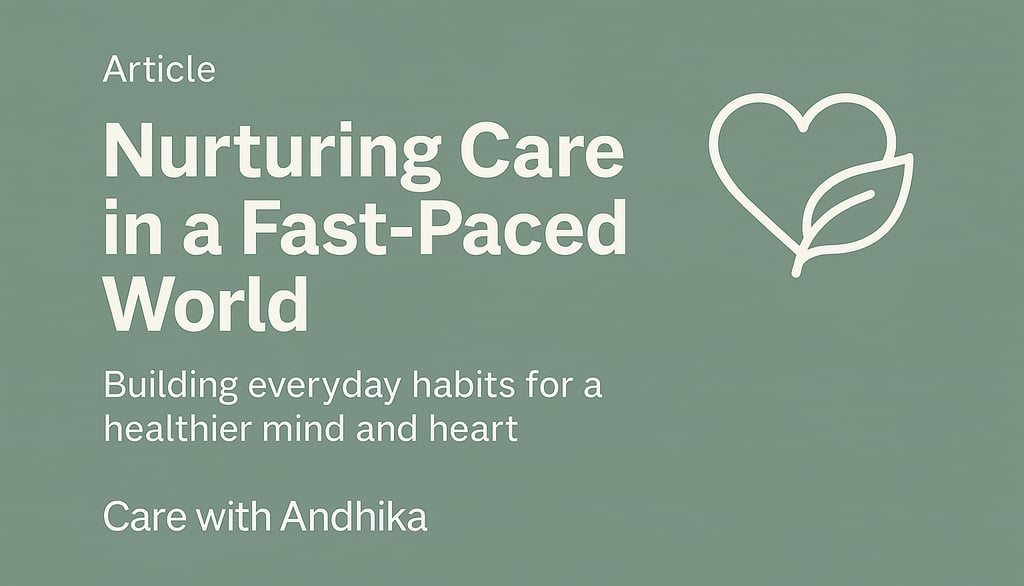Nurturing Care in a Fast-Paced World
Building Everyday Habits for a Healthier Mind and Heart
CARE WITH ANDHIKA
By Care with Andhika Team
8/31/20252 min read


1. The Power of Small Acts of Care
Care does not always mean grand gestures. Sometimes it’s as simple as:
Drinking enough water in between meetings
Taking three deep breaths before making a big decision
Sending a kind message to a friend
Pausing to appreciate a quiet moment
Psychologists have found that micro-habits like these can reduce stress hormones and help regulate emotions. They act as “anchors,” reminding us that well-being is not built overnight but shaped by consistency in the smallest of actions.
When practiced consistently, these small acts form a foundation of resilience that allows us to handle bigger challenges with grace. In fact, research on habit formation suggests that repeating even a two-minute care ritual daily can rewire the brain toward more positive coping mechanisms.
2. Reconnecting with Yourself
Self-care isn’t indulgence—it’s maintenance. Just like we charge our phones daily, our minds and bodies need regular recharging. Without this, we risk burnout—a state of exhaustion that affects not just productivity, but also our ability to feel joy.
Practical ways to reconnect with yourself:
Journaling: Write down thoughts, feelings, or even gratitude lists. It clears mental clutter.
Mindful walks: Even a 10-minute stroll outdoors can refresh your perspective.
Digital boundaries: Set limits on screen time and give your mind space to rest.
Mindful breathing: Inhale for 4 seconds, hold for 4, exhale for 4—repeat three times.
By listening to your inner needs, you not only protect your energy but also show up more fully for others. Remember: you cannot pour from an empty cup.
3. Extending Care Beyond Yourself
True care expands outward. It’s about how we treat colleagues, family, strangers, and even our environment.
At work: Empathy can transform workplaces. A small check-in with a teammate can make them feel seen and supported.
At home: Patience in conversations often matters more than quick solutions.
For the planet: Choosing reusable items or reducing food waste is also a form of care that ripples far beyond us.
When we extend care outward, we create ripples of positivity—strengthening relationships and building communities that thrive on kindness. Neuroscience even shows that acts of giving activate the same reward centers in our brains as receiving—meaning generosity literally makes us feel better.
4. Why Care Matters in Times of Change
We live in an era of constant transitions—career shifts, economic uncertainty, digital overload. In such times, care becomes an anchor. It grounds us in what truly matters: health, connection, meaning.
Organizations are also recognizing this. Companies that embed care into their culture—through mental health support, flexible work, and empathetic leadership—see higher levels of engagement and lower turnover. Communities that foster collective care also recover faster from crises.
Care, in essence, is not just personal—it is systemic. And change begins with us.
5. A Gentle Reminder
Caring is not about perfection. Some days you’ll do more, some days less. What matters is the intention to show up—for yourself, and for the people around you.
At Care with Andhika, we want to be your companion in cultivating these small, sustainable habits of care—so that together, we can create a world where compassion resonates louder than chaos.
✨ In a world of change, care is what lasts.

